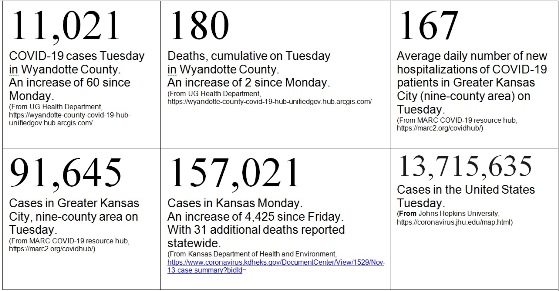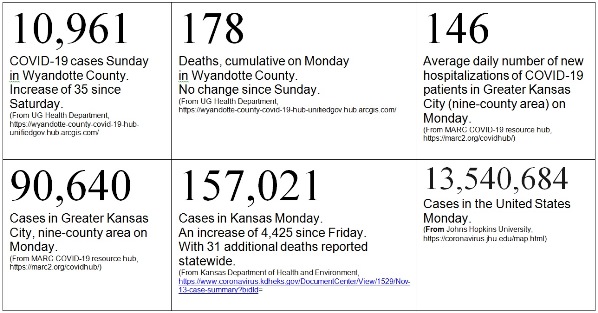
The first coronavirus vaccines will go to health care workers, nursing home residents and staff, following a vote on Tuesday by the federal Advisory Committee on Immunization Practices.
About 21 million health care workers and 3 million residents and staff at nursing homes and long-term care facilities will receive the first doses of the vaccine.
Dr. Kevin Ault, an obstetrician at the University of Kansas Health System who is on the federal committee, said the committee had to make decisions about who would get the doses first.
The challenging part of Tuesday’s vote was that complete data isn’t in yet from the Phase 3 trials, and the committee would like to know what the safety and efficacy of the vaccine is in the long-term care population, he said. Data is expected to become available next week for the first vaccine, he added.
Dr. Ault, who was not speaking on behalf of the CDC, has served on the federal committee for more than 10 years and also participated in planning for the H1N1 vaccination.
The reason long-term care facilities came to the front of the COVID-19 vaccine distribution was because of the tremendous mortality in that group, with about 100,000 deaths in the United States, he said.
The local facilities will decide which health care workers get the vaccines first at their institutions, he said. Those who work in the intensive care units may be among the first health care workers to be vaccinated at some hospitals.
Dr. Steve Stites, chief medical officer at the University of Kansas Health System, said the health care workers at KU Health System who would be vaccinated first would include those who have direct contact with COVID-19 patients, then physicians, nursing, dietary, and housecleaning workers who are around COVID-19 patients. After that, the rest of the health care workers would be vaccinated.
He said vaccinating nursing home residents and staff is a critical piece that will help hospitals because they are often a source of patients that come directly to the intensive care unit.
Dr. Ault said today’s vote was “interim guidance.” Between now and the winter holidays there may be quite a bit of additional voting and more news about the two vaccines that have applied for emergency use authorization, he said.
It’s possible that after about a week after the FDA approves the vaccine, it could be shipped, Dr. Ault said. There is a challenging handling process with some of the vaccines because of the temperatures, he added. There are many facilities in Kansas and Missouri that can handle the low freezer temperatures necessary, according to Dr. Stites.
Another challenge is there are about 20 million people in the health care workers group, and 3 million in the nursing home group, and everyone will need two doses, Dr. Ault said. Probably for the first few weeks, and possibly months, of the rollout, all the vaccines will be going to these two groups, he said.
The state health agency will be in charge of distribution in each state, and there is also a plan in each state that specifies who will be the first recipients.
Dr. Stites said that once the vaccines are shipped to a local institution, such as a hospital, the hospital will make decisions about how it may be distributed among the health care workers, and the distribution may be a little different at each hospital.
Dr. Stites said the big question may be how many doses each state will get, and they don’t know that yet.
Those health workers who get the early vaccine may be able to use a cell phone program to report any side effects, according to Dr. Ault.
Case numbers increase
KU Health System reported 101 active COVID-19 patients were hospitalized on Tuesday morning, with 53 patients in the intensive care unit and 24 on ventilators, according to Dr. Dana Hawkinson, medical director of infection prevention and control. On Monday, there were 102 active patients, 46 in the ICU and 30 on ventilators. There were an additional 58 patients still hospitalized because of COVID-19, but who are in the recovery phase, an increase from 50 on Monday. The total on Tuesday was 159, up from 152 on Monday.
At HaysMed in Hays, Kansas, there were 32 COVID-19 patients hospitalized, a decrease from 35 on Monday. Twenty-four were active COVID-19 patients and eight were in the recovery phase.
Wyandotte County reported an additional 60 COVID-19 cases on Tuesday, for a cumulative total of 11,021, according to the Unified Government COVID-19 webpage. There were an additional two deaths reported, for a cumulative total of 180.
The Mid-America Regional Council’s Kansas City Region COVID-19 Resource Hub reported 1,005 additional COVID-19 cases on Tuesday in the nine-county area, for a cumulative total of 91,645. There were a cumulative 1,106 deaths reported. The average daily new hospitalization rate was 167 in the nine-county area, an increase from Monday. There was an average of 757 COVID-19 patients who are hospitalized in the nine-county area, according to the resource hub.
The Johns Hopkins COVID-19 Dashboard reported a total of 13,715,635 COVID-19 cases in the United States on Tuesday.
Free COVID-19 testing available Wednesday
Free COVID-19 testing will be available from 3 p.m. to 6 p.m. Wednesday, Dec. 2, at Faith Deliverance Family Worship Center, 3043 State Ave., Kansas City, Kansas.
The pop-up test is through Vibrant Health and the Wyandotte County Health Equity Task Force.
The Unified Government Health Department has moved its COVID-19 testing from the 6th and Ann location to the former Kmart at 78th and State Avenue in Kansas City, Kansas. The hours are 9 a.m. to 3 p.m. Monday through Friday.
Tests are free for those who live or work in Wyandotte County. The tests are now saliva COVID-19 tests.
The tests now are open to asymptomatic people as well as those who have symptoms or have been exposed to COVID-19. Check with the UG Health Department’s Facebook page to see if there have been any changes in the schedule. Bring something that shows that you live or work in Wyandotte County, such as a utility bill.
For more information about the testing site at the former Kmart location, visit https://alpha.wycokck.org/files/assets/public/health/documents/covid/10092020_newtestingsitewyco.pdf.
Dr. Ault’s news conference is at https://www.facebook.com/kuhospital/videos/3478657525588524.
The KU doctors’ morning news conference is online at https://www.facebook.com/kuhospital/videos/3648856758470095.
For more information, visit https://wyandotte-county-covid-19-hub-unifiedgov.hub.arcgis.com/pages/what-to-do-if-you-think-you-have-covid-19.
The new Wyandotte County health order with a limit of 10 persons to a gathering, and a closing time of 10 p.m. for restaurants and bars, with other new restrictions, is at https://alpha.wycokck.org/files/assets/public/health/documents/covid/11162020localhealthorderexecuted.pdf.
The UG COVID-19 webpage is at https://alpha.wycokck.org/Coronavirus-COVID-19-Information.
The KDHE’s COVID-19 webpage is at https://www.coronavirus.kdheks.gov/.
The KC Region COVID-19 Hub dashboard is at https://marc2.org/covidhub/.
The Wyandotte County page on the Johns Hopkins COVID-19 website is at https://bao.arcgis.com/covid-19/jhu/county/20209.html.
The CDC’s COVID-19 webpage is at https://www.cdc.gov/coronavirus/2019-nCoV/index.html.

